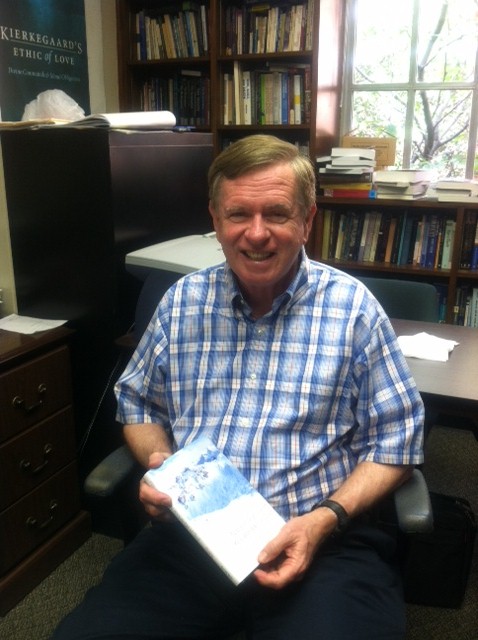Baylor Philosophy Professor Wins Prestigious C.S. Lewis Book Prize

Dr. C. Stephen Evans wins award for his latest book.
Media Contact: Terry Goodrich, (254) 710-3321
@BaylorUMedia
WACO, Texas (Sept. 14, 2012) -- C. Stephen Evans, Ph.D., University Professor of Philosophy and Humanities at Baylor University, has won first prize in the C.S. Lewis Book Prize Competition, awarded for the best book published in the philosophy of religion or philosophical theology written for a general audience in the last five years.
The prize, awarded by the University of St. Thomas in St. Paul, Minn., and funded by the John Templeton Foundation, carries with it a cash award of $15,000. Twenty-two entries were judged on quality of argumentation, importance of the positions argued for, level of accessibility to a general audience, and stylistic or literary merits.
Evans' book, Natural Signs and the Knowledge of God: A New Look at Theistic Arguments (Oxford University Press, 2010), has been described by reviewer John Cottingham in the Times Literary Supplement as "lucidly written and carefully argued."
"I'm thrilled. I'm grateful," said Evans, who teaches in Baylor's College of Arts & Sciences. "There are a lot of great books on the philosophy of religion, so to have my book selected as the best is a great honor."
At the heart of the book are several relatively simple ideas, according to its synopsis. One is that if there is a God of the kind accepted by Christians, Jews and Muslims, it is likely that a "natural" knowledge of God would be widely available yet also "easily resistible." Evans argues that such a knowledge is made possible by "natural signs," such as our sense of wonder that the universe exists at all, our sense that the universe is meaningful and purposeful, and our sense of moral responsibility. These signs can be developed into the classic arguments for God's existence, and such arguments have considerable force. However, they also can effectively point people to God without any argument or inference.
While Evans' book is a new work, some of the ideas were introduced in his previous book written at a popular level, Why Believe? Reason and Mystery as Pointers to God.
"I always thought those ideas needed to be developed rigorously so that they would be taken seriously by scholars," he said.
"The theistic arguments come from ideas that go all the way back to the ancient Greeks," Evans said. "Some people find them very convincing, and some don't . . . The core of each of these arguments doesn't necessarily prove the existence of God, but someone who knows how to read the signs and is open to their meaning will find the evidence convincing.
"My view is that God doesn't want to push himself onto those who don't want to have a relationship with Him."
Evans said he wrote his book partly in response to the New Atheists, who hold that belief in God has no rational basis. Some contemporary cognitive psychologists think that religious faith is discredited because humans are biologically and psychologically "hard-wired" to believe in a higher power.
"They claim that discredits belief, but in my book, I argue that if we are hard-wired to believe in God it is because God has created us that way: we have a natural impulse to believe," he said.
Evans formerly taught at Calvin College, St. Olaf College and Wheaton College. He has published numerous books and articles in the philosophy of religion and on Danish philosopher-theologian Søren Kierkegaard. Evans also is a past president of the Society of Christian Philosophers and of the Kierkegaard Society of North America.
ABOUT BAYLOR UNIVERSITY
Baylor University is a private Christian university and a nationally ranked research institution, characterized as having "high research activity" by the Carnegie Foundation for the Advancement of Teaching. The university provides a vibrant campus community for approximately 15,000 students by blending interdisciplinary research with an international reputation for educational excellence and a faculty commitment to teaching and scholarship. Chartered in 1845 by the Republic of Texas through the efforts of Baptist pioneers, Baylor is the oldest continually operating university in Texas. Located in Waco, Baylor welcomes students from all 50 states and more than 80 countries to study a broad range of degrees among its 11 nationally recognized academic divisions.
ABOUT BAYLOR COLLEGE OF ARTS AND SCIENCES
The College of Arts & Sciences is Baylor University's oldest and largest academic division, consisting of 26 academic departments and 13 academic centers and institutes. The more than 5,000 courses taught in the College span topics from art and theatre to religion, philosophy, sociology and the natural sciences. Faculty conduct research around the world, and research on the undergraduate and graduate level is prevalent throughout all disciplines. Visit
www.baylor.edu/artsandsciences